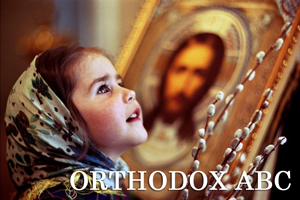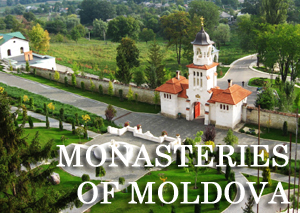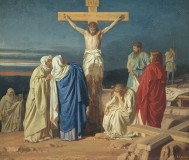
The Orthodox Church is for all people, irrespective of country, race or culture. Patriotism – a proper and proportionate love for one’s country – is right and natural, but a strident nationalism or a feeling of superiority can have no place in Orthodoxy.
Here in Britain, Orthodox Christians come from a variety of backgrounds. There is need on all sides for tolerance and sensitivity, making due allowance for differences in history, national outlook and temperament, if we are to avoid friction and unintentional offence. While it is essential to keep the good elements in our national and historic traditions, at the same time it is equally essential to hold firmly to the universality of the Orthodox Church. In Christ “there is neither Jew nor Greek”.
In the British Isles, for instance, we can trace our Orthodoxy back to almost the beginning of the Christian era. Church here was Orthodox from Romano- British times until the Great Schism, so in being received into the Orthodox Church, British people are returning to the original Christian Faith of this country, and this has to be taken into account. They cannot be expected to become Greeks or Russians in order to feel that they belong in the Church. As there is no indigenous Church here, converts will obviously be received via a national jurisdiction – usually Greek or Russian – but they will be received into the One, Holy Orthodox Church of Christ.
At the same time, as several theologians have pointed out, if we are Orthodox then, in one sense, we are also Greek. Divine providence ordered that when the time came for the spreading of the Gospel, there was a network of excellent Roman roads making land travel safe and relatively easy, while Roman warships guarded the seas, and at this time only in history, Greek was the universal language of the Roman Empire. St Paul himself a Jew and also a Roman citizen, from the Greek city of Tarsus, could speak with Romans, Athenian philosophers and Galatian tribesmen.
Greek was the language of the New Testament, of the documents of the Ecumenical Councils, of the majority of the Fathers, and of the great hymnology of the Church. The Church service books were brought to their final form at the famous monastery of the Studion in Constantinople. Monasticism was firmly established in the Byzantine Empire, together with the Church’s iconography. The major heresies were dealt with at the Councils’ meeting in or near Constantinople, and the Nicene-Constantinopolitan Creed proclaimed as the authoritative statement of faith. All this is our common Orthodox heritage. In this purely ecclesiastical sense, you cannot separate Greek from Orthodox. The Greek brothers, Saints Cyril and Methodios would become missionaries to the Slavs. Pope Gregory the Great, having been in Constantinople as a deacon, would introduce a simplified form of Byzantine chant –Gregorian chant – to the West.
For the Greek people, Orthodoxy is inextricably linked with their national history. The fall of Constantinople was followed by centuries of oppression under the Ottoman Turks, during which the Greek Church produced many New Martyrs from among the ranks of both laity and clergy, – including Patriarchs, – holding fast to the Faith and fostering patriotism among the people. Many of today’s older Greekspeaking population in Britain are refugees from more recent conflicts in Asia Minor and Cyprus. It is easy to understand how, in a purely nationalistic sense, “Hellenism” has, at times, become almost synonymous with Orthodoxy.
We should all rejoice in the different treasures and strengths that each part of the Orthodox Church has to offer to the whole Body. The Church of Jerusalem, for instance, alone has the incomparable honour of being the custodian of the Holy Places directly connected with Our Lord’s life on earth, with His Crucifixion, Resurrection, Ascension and Pentecost. The Church of Russia went on to develop a unique style of iconography, church building and chant, and continuing the tradition of the spiritual counsellor, the Elder, gave us the famous Russian Startzi, while among her many saints are the notable missionaries Nicholas of Japan and Herman of Alaska. Prior to the Revolution, Russia was pre-eminently the land of pilgrims. The thousands upon thousands of New Martyrs of the Soviet Era, who endured undescribable sufferings, are the glory not only of the Russian Church but of the whole Orthodox Church. As with Greece, the Church in Russia was bound up with the nation for centuries.
Each of the other local Churches has its own particular gifts to share with us all, and if we do not understand and appreciate this, then our spiritual life will be the poorer and our vision of the church will be onesided and incomplete. Hopefully, as far as Britain is concerned, Greek, Russian and other Orthodox people here will come to learn something of the treasures of Celtic and Saxon Christianity, because this, too, was once a land of saints, holy hermits, formidable abbesses and Royal Martyrs.
Christianity is a missionary faith. In this post-Christian era we are once more facing a genuine missionary situation. Unfortunately we have in this country the abnormal and uncanonical situation of multiple jurisdictions, which has at times led to an “ethnic ghetto” mentality and inter-jurisdictional tensions. As a result, our unity as Orthodox is dispersed and our witness to the non-Orthodox fragmented and largely ineffective.
Many of the parishes here were originally started by refugees and displaced persons who needed the support of their fellowcountrymen and their national Church. The jurisdictions to which they belong now face the double challenge of trying to communicate with their own estranged young people, whose first language is English and who no longer understand the Church services, and who have become assimilated into the current British culture, although they may still keep some of theold “folk” customs, and also with the British people, the majority of whom know absolutely nothing about Orthodoxy, though some may be seeking a spiritual home.
Converts have not always been readily encouraged. Too often the various national groups simply cannot see why anyone from a different ethnic and cultural background should want to join them. At the same time, tensions are caused when converts come into the Church poorly taught and without any proper understanding and then try to adapt the Faith to suit themselves, or give the impression that they are trying to teach the Orthodox. This does emphasize the importance of thorough preparation and sound instruction for catechumens.
The ongoing problem of the anomaly of numerous jurisdictions and the need for a united witness to the truth of the Orthodox Faith needs to be addressed urgently by the leaders of the Churches. Until the difficulty can be resolved we all need to work together in a spirit of conciliarity and give priority to the growth of spirituality rather than be overly concerned with worldly and national considerations.
Parish churches will vary. Some will use English in their services, others will not. Some will keep the Old Calendar, some the New. Customs at the Great Feasts will reflect different cultural backgrounds. There will be differences in practice regarding Confession and the frequency of receiving Holy Communion. Naturally enough, some people will feel more at home in a parish church belonging to a particular jurisdiction, others will feel equally at home anywhere. But we all belong to the One Orthodox Church and for all of us our ultimate home is the perfected Church, the Jerusalem above which is the Mother of us all”.
Miriam Lambouras
Source: SOUROZH Magazine Nr. 105, p.p. 28-30
Magazine of the Diocese of Sourozh of the Patriarchate of Moscow
(Russian Orthodox Church)
Cover image: Crucification. Sorokin E.S.
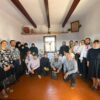 Memorial house of romanian elder Sofian Boghiu Consecrated in his native Village
Memorial house of romanian elder Sofian Boghiu Consecrated in his native Village 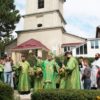 On the 14th Sunday after Pentecost, His Eminence Metropolitan Vladimir celebrated the Divine Liturgy in the St. Nicolas Monastery, Dobrusa village, Soldanesti region
On the 14th Sunday after Pentecost, His Eminence Metropolitan Vladimir celebrated the Divine Liturgy in the St. Nicolas Monastery, Dobrusa village, Soldanesti region 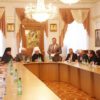 Inauguration of the volume of articles presented at the National Scientific Conference “The Orthodox Church and the State: Faith and Knowledge”
Inauguration of the volume of articles presented at the National Scientific Conference “The Orthodox Church and the State: Faith and Knowledge” 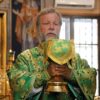 The 12th Sunday after Pentecost – kindness in God changes the world we live in
The 12th Sunday after Pentecost – kindness in God changes the world we live in 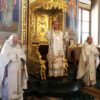 The 11th Sunday after Pentecost – loving our God and our neighbor
The 11th Sunday after Pentecost – loving our God and our neighbor 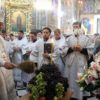 The Transfiguration of the Lord, celebrated in the Nativity of the Lord Cathedral in Chisinau
The Transfiguration of the Lord, celebrated in the Nativity of the Lord Cathedral in Chisinau 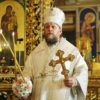 His Eminence Metropolitan Vladimir celebrates 65th anniversary
His Eminence Metropolitan Vladimir celebrates 65th anniversary  Divine Service at the St. Theodore of Tyre Monastery (Ciuflea) in Chisinau, and congratulation of Archimandrite Nicolae (Rosca), the Monastery’s confessor-administrator, on the 50th anniversary.
Divine Service at the St. Theodore of Tyre Monastery (Ciuflea) in Chisinau, and congratulation of Archimandrite Nicolae (Rosca), the Monastery’s confessor-administrator, on the 50th anniversary.  The Tenth Sunday after Pentecost: Divine Liturgy in the Nativity of the Lord Cathedral in Chisinau
The Tenth Sunday after Pentecost: Divine Liturgy in the Nativity of the Lord Cathedral in Chisinau 
